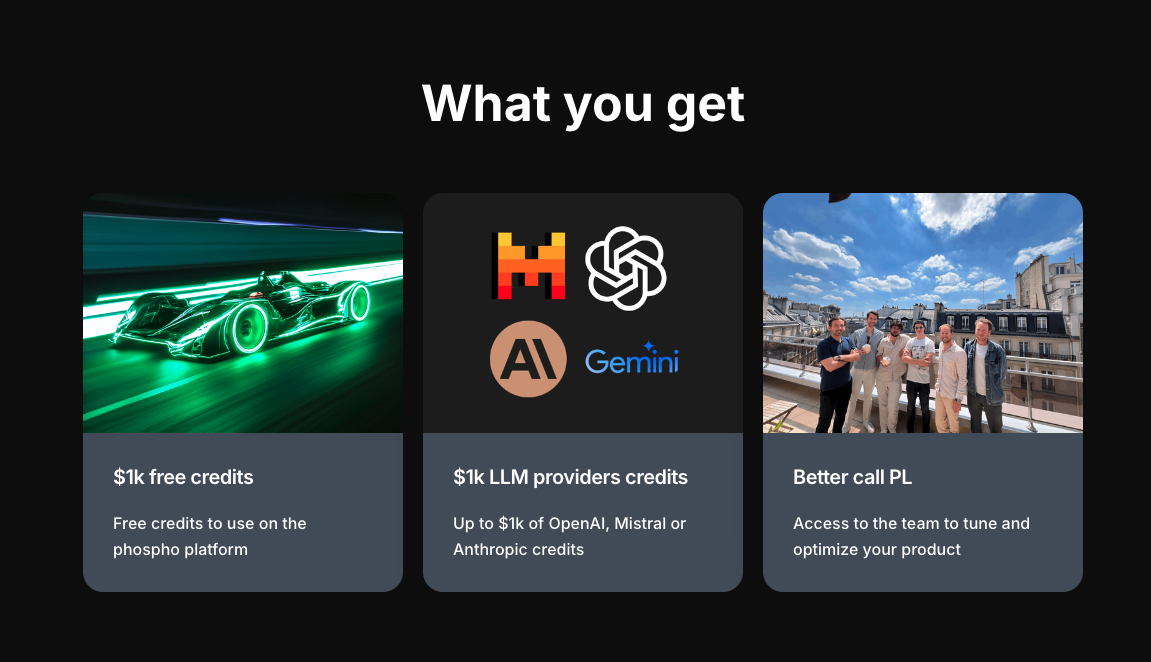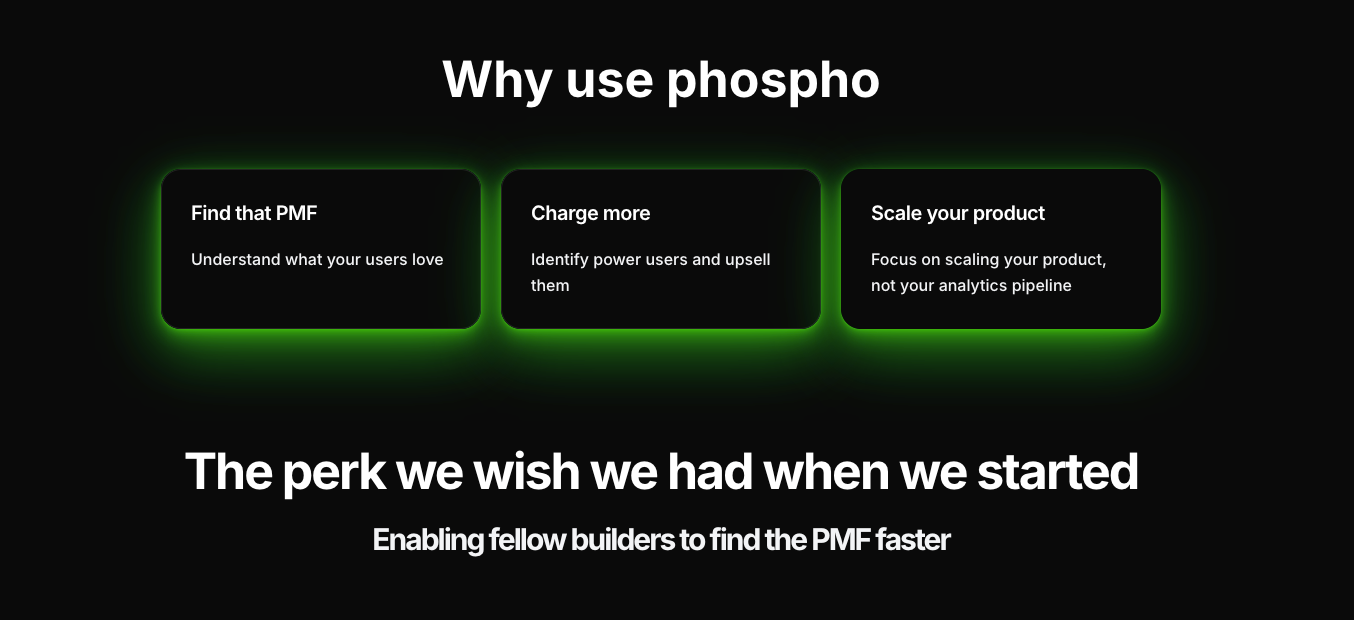Phospho startup program: Get free Openai startup credits to build your AI SaaS
Phospho’s startup program offers $2000 in OpenAI startup credits and analytics tools to help AI SaaS startups scale faster. By joining, you reduce costs and receive expert support, enabling rapid iteration, testing, and PMF achievement. Perfect for early-stage AI SaaS companies.

Our free startup program gives you $2000 worth of OpenAI credits and Phospho analytics to help you get to product market fit (PMF) faster without worrying about any scaling costs:
- $1000 of credits for OpenAI, Anthropic, Mistral, or Gemini
- $1000 of credits for Phospho AI analytics
- Exclusive access to our founding team for any technical support
You can join free here: Apply for Phospho Startup Program.
This program was initially exclusive to YCombinator startups, but we’re now opening it up to help a wider range of early stage AI SaaS startups who would benefit from our financial and technical support.
You could say our program is a mini YC for AI SaaS…
How does this help if I’m building an AI SaaS?
- Our credits reduce your early stage costs letting you test, iterate and optimise your AI SaaS freely and just focus on building your core product
- Find PMF quicker by leveraging Phospho analytics (we can help with this)
- Founder and team support to help you with anything
Getting personalised support and feedback from us, the founding team, is rare in the startup ecosystem but it will give you a real competitive edge. It’s also what we wish we had when we started.
If you want free credits and bespoke support, join our program now before spaces are filled up!
For more details like eligibility you can read our one pager here.
Why Perks Like OpenAI Startup Credits are Essential for AI SaaS Companies
Early stages of development always require testing and hopping between different LLMs, because how else can you find which model is best for your AI SaaS without trying them out?
Cover AI Usage Costs
The issue is LLM providers like OpenAI charge based on usage so the costs can quickly rack up when testing them out and become prohibitive for early startups.
Our free $1000 in openai startup credits is a way to cover your AI usage costs so you can experiment freely with different models.
You can also read our previous articles comparing GPT-4 with Claude 3 here, or GPT-4 with Gemini here.
Accelerate Time to Market
With a risk free way of experimenting with the best models, you can quickly identify which one is best for your requirements and start iterating on top of it.
Using our free openai startup credits, startups can deploy their first models faster and go straight to optimising the user experience with each iteration.
But for iteration cycles to be effective you need the right data, this is why we also include $1000 of credits with Phospho in the program.
Faster Product Market Fit (PMF)
Finding PMF requires a lot of iteration.
Many startups find it hard to reach PMF with their AI models because they can’t afford the API usage costs that come with high volume testing and iteration.
But we know with our free openai startup credits, AI SaaS startups can now:
- Explore more use cases to test and validate market opportunities without cost
- More usage means more feedback from real interactions to shape the product and direction based on actual user needs and preferences.
- Leverage Phospho for insights from that and iterate more efficiently towards PMF
For $1000 of openai credits and premium support to find PMF faster, Apply for Phospho Startup Program.
Deep Dive into Phospho’s Value for AI SaaS Companies

For any AI SaaS the user interactions are a huge pool of data.
Phospho is our real-time analytics platform that lets you log, monitor and evaluate this data to derive insights and improve your AI model performance.
To put it simply, its like automated user testing and rich analysis at scale for your AI SaaS.
With that context, let’s look at Phospho ‘s key features to understand how you can grow and scale your AI SaaS with the $1000 of free credits.
Monitoring LLM Interactions in Real-Time
Phospho lets you track every conversation and log user inputs to identify issues or trends for immediate insights into the performance of your AI SaaS and how users are engaging with it.
You can also attach user feedback to specific interactions in the logs as well to provide more contextual analysis for better understanding towards how you can optimise the AI model’s outputs.
Tip: Once Phospho is up an running you can do this quite easily without any coding know-how, that way it’s not restricted to developers and more collaboration is possible.
Extracting Meaningful Insights from Data
With access to all user interactions within your AI SaaS, all that’s required is data analysis to extract deep insights for:
- Highly effective iteration cycles
- Faster product market fit
- ‘Stickier’ products with lower churn
- Identify what to upsell to different users
- and increased competitiveness in the market
This level of user-driven insights helps to build what your users really need, as well as simultaneously detect any potential vulnerabilities or edge cases that could later become problematic.
To start leveraging Phospho, join our startup program and also get $1000 of free credits to OpenAI, Anthropic, Mistral, and Gemini here: Apply for Phospho Startup Program .
For a walkthrough of the process an AI SaaS could take with Phospho, read our previous article using an AI chatbot as an example here.
Tailored Metrics for Performance Evaluation
With Phospho you can automate your evaluation by creating custom KPIs and events to track and measure what’s most relevant to your AI SaaS and business goals right now.
These bespoke metrics can be used when monitoring user interactions in real-time by flagging anything that meets those requirements whether they’re specific conversations or patterns in app-wide usage.
You can create these metrics and events in natural language which lets you automate evaluations for any number of specific use cases or scenarios.
AI SaaS teams should leverage Phospho’s custom KPIs and events when looking to find PMF, optimise their user experience, test hypotheses, or detect edge cases.
Automating Model Evaluation and Improvement
User needs will always be evolving, and new pain points or bottlenecks will emerge - that’s a given. So it’s imperative that AI SaaS teams continuously evaluate their product’s performance.
With Phospho’s continuous evaluation pipeline you can automate that process. Phospho can monitor and assess the performance of your AI SaaS against any number of custom KPIs and metrics to ensure your AI model’s performance is aligned with real-time user needs.
You can then A/B test different versions of your AI SaaS through Phospho’s interface to see which ones perform better for your users. Being able to measure outcomes and performance differences between different iterations helps you continuously and qualitatively provide a better user experience with each new release of your AI SaaS.
With Phospho you can automate as much of the evaluation process as you want and streamline the development process along with it.
Easy Integration with Popular Tools and LLM Providers
Simply plug Phospho into your tech stack with a couple of lines of code with our API, see docs here.
We’ve made it really easy to integrate Phospho into your workflow so you can quickly get going with your openai startup credits and also take advantage of Phospho’s analytics.
To access both Phospho and get $1000 of free OpenAI credits, join our free startup program here: Apply for Phospho Startup Program .
Conclusion: Phospho and OpenAI Credits — The Perfect Combo for AI SaaS Success
We know the path to PMF requires a lot of iteration and upfront costs.
That’s why we’re offering startups in our program $2000 in total credits to help scale their AI SaaS. Inside our free program you also get expert support from the Phospho team to help you reach PMF faster.
This is all free - we can’t even overstate how much we wish we had this when we started.
You should apply now because of limited spaces! If you need to check your eligibility first you can read more here.
